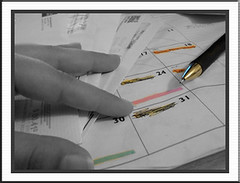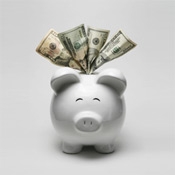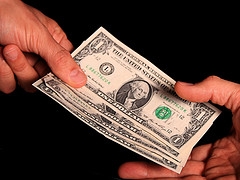Related Links:
Showing posts with label personal finance. Show all posts
Showing posts with label personal finance. Show all posts
When did the Jones become the American standard for living? I think frugality gets a bad rap because of the stereotypes associated with cheap behaviors. As a college student my dad advice me to make as much money as possible; it was good advice but it was hard to do without a degree. I followed his advice by maintaining 2-3 jobs and picking up as much over time as possible. I learned to value frugality as a nice alternative to the sacrifices I made during that time. Becoming frugal can turn into a lifestyle or can be just a tool used to help get in control of your finances. I came up with a list of tips that might help you save some pennies (hopefully at a decent interest rate).
- Dine in like you eat out- When you're craving food from a certain restaurant go one of many copycat sites and to find the recipe. At home you can control cost and calories. Plus you can impress your friends and family. Keep healthy snacks at home and in the car so you will be less tempted to stop at the nearest fast food joint. If you're not a health nut, buy junk food in bulk; better yet learn to make to make it from scratch.
- Switch to online bill pay- Spend less on stamps by paying your bills online or set up automatic bill pay to avoid late charges. Make a habit of routinely balancing your checking account by comparing your online statement with your register (daily is best but at least weekly). Call to cancel payment ahead of time if you are not going to have the funds for your payments; late fees are cheaper than overage charges.
- Strategic shopping- Planning out your shopping list works great for grocery shopping, but use it for clothes or any miscellaneous item. Keep a notebook of your frequent purchases and write down the different prices from the places you shop most often. Compare prices, sales papers and coupons to create a shopping list. It is somewhat time consuming in the beginning but gets easier with time.
- Flip the switch- Of course you already know how to turn off the lights when you leave a room, but it can take some discipline. There are lots of ways to save on your energy bill: keep used appliances unplugged (cell phone chargers consume a lot of energy), switch to CFL bulbs, wash clothes in cold water and line dry when you can, close heat vents in rooms you don't use, buy heavy drapes (or put up plastic) to keep the cold air out.
- Consolidate car trips- Plan ahead by grouping your errands and activities together by proximity. Invest in a backpack so that if you need to pick up a few items that are just down the street, you can leave the car at home and take a walk or ride your bike.
- Carry your own water- Want to avoid the plastic scare, buy stainless steel containers for your family. Make sure to take them everywhere; I'd suggets using even when your at home, washing them once a day or more often as needed. It saves you money from beverage purchases, calories from sugar, and time from washing cups.
- DIY your latte- A lot of people heard about the latte factor. If you can afford luxuries like manicures and Star$$$s, enjoy them guilt free. Just create a budget and abide by it (ex. $100/month for hair care). Supplement your routine in between appointments or purchases by learning how to Do It Yourself.
- Consume less- I know it's easier said than done, but all it takes is effort: Measure out food portions according to the suggested serving size, keep a sewing kit handy or take clothes to dry cleaners for mending, organize your closet so that like items hang together ( it helps you avoid buying clothes you already have), take a shorter shower (set a timer if it helps), before you throw something away ask yourself can you repurpose it instead, ask friends for cuttings from their plants and pot them, turn off the water while you brushing your teeth and put a half a gallon water jug in the toilets tank.
- Free fun- frequent your local library for books and movies, play board games, look in the paper for free events for the family, visit site that list fun activities, plan pot lucks with friends instead of going out to eat, spend more time outside (go read at the park, have a snowball fight with the kids, buy a kite and have a picnic)
- Always take paper over plastic- to slow down spending come up with a spending plan that also includes fun money and only carry cash allotted. If you are a credit card or debit card prone, try freezing your cards in a cup of water. That will give you a little time to reconsider your desired purchase.If frugal living appeals to you try a few of these tips and track how much money you save in one month. If it is worth it keep it up and add some new habits. A lot of these tips not only save dough but can impact the planet. Avoid envy of other's lifestyle by writing down a list of things that you value the most. Your priorities should be reflected in your spending plan; I'll take an emergency fund over an expensive mortgage any day. Don't worrying about the Jones; who knows they just might just go green trying to keep up with you.
You've read some of my tricks now it's your turn. Please leave a comment and share your personal money saving tips.
 Originally uploaded by watersgirl
Originally uploaded by watersgirlAin’t got no money, but they won’t leave me alone. Ieeehooowaaaa, thank you, thank you very much. My family is worried about me. I’m not working and have no plans or desire to get a job. When they bring it up, I tell them that my husband and I can make it without the extra income. How can I be reassuring after my car loan company calls them? For reasons I’ll share later, my husband and I decided that it is better for me to stay at home right now. At this point, we are both rethinking our plans, but things are complicated.
I don't recall any formal money lessons from my parents, like why net worth is important or how to maintain a good credit score, but I did hear golden nuggets from time to time. My dad instilled the belief that frugality is power (the less you need, the more you’re in control), and he told me it was important to have your own business. My mom showed me how strategic shopping streches the dollar and how self discipline (telling yourself no) is a necessity. Both parents taught me that if you need more money, work more hours and increase your skills so that you can get raises and promotions. My grandmother used to tell me all the time to pay myself first. I was never sure what that meant, but I assumed it meant to take out some money and put it into my savings.
By the time I went to college, I’d saved $3,000 and was very proud of myself, but I had no plan and very little financial intelligence. My first semester I paid for half of my tuition and my dad paid the other half. That left me $1,500 in the bank, and it did not take long to spend the rest. I paid for college with credit cards and student loans. I thought I was better off than my friends who were getting into debt for clothes, hair and trips. The more I worked, the more frugal I became, but my debt still grew as the tuition was raised every year. I started off financially responsible at first, paying off my credit card balances after every purchase, only charging school related stuff, and paying bills as soon as I received them. But then I started making mistakes, like buying my friends books with the agreement that they would pay me back. After watching them buy new clothes despite their claims that they didn’t have the money to pay me back, I learned not to loan money I couldn't afford to give away.
For the first time, I enjoyed studying, completing homework, and doing research for my classes. I’d never received a 4.0 in high school, but I was happy now that I could go out whenever I wanted to and did not work. I did great academically. The problem was that when I started adding bills, that led to needing more hours at work. Every addition to my work schedule was a subtraction from my GPA. The less content I was, the more money I needed: I needed more privacy, then I needed an apartment, then I needed a car, then I needed car insurance, then I needed ...
Fast forward to now. I have a lot of debt (mainly school loans), no degree, and no job. I understand much more about money and building wealth, but money has more to do with your values and fears than it does with accounting skills. Knowing is a small part of the battle when you consider things like family dynamics, personal priorities, and health complications. This does not jutify bad decisions, but personal realities cannot be ignored. You should always look both ways before you cross the street, but if a serial killer is chasing you with a butcher knife, you might change your priorities to getting away and calling attention to yourself. Regardless, I still make tons of mistakes; I won't deny making dumb decisions, but most of my money decisions are made with a lot of consideration and discernment. Sometimes my best does not seem like much, but only I know the efforts I make to improve my station in life. I can't explain why it makes sense to start blogging for profit when I need money now. All I can say is living a life without passion and purpose is not really living. Yes, I still have the Bad Credit Blues, but I'm in the process of finding my thrill.
Subscribe to:
Posts (Atom)






